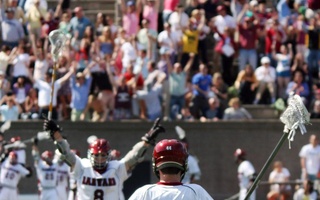
Captain forward Keith Wright and the Harvard men's basketball team received a No. 12 seed in the NCAA tournament. Some Ivy coaches, such as Yale's James Jones and Columbia's Kyle Smith, disagree with the seeding and believe Harvard was dealt an unfair hand.
By now, everyone has heard the news. For the first time in 66 years, Harvard men’s basketball will be making an appearance in the NCAA tournament. And on Sunday night, the Crimson received its seeding: 12th in the East region. In its opening round, Harvard will take on fifth-seeded Vanderbilt on Thursday.
History has been made. The curse of ESPN3 has been broken. A new era of Ivy League basketball has supposedly begun. But did the Crimson get cheated along the way?
According to some NCAA experts, sportswriters, and coaches, the answer is yes.
As recently as Saturday afternoon, ESPN’s Joe Lunardi placed Harvard in the No. 10 position of the Midwest region. This seeding would have pitted the Crimson against Gonzaga, a team that Lunardi correctly positioned at the No. 7 slot. Similarly, CBS Sports’ Jerry Palm also predicted the Crimson at No. 10.
Yale men’s basketball coach James Jones attributed Harvard’s drop in the brackets to the team’s lack of viewership throughout the season.
"What you find is that not a lot of people on the selection committee actually watch a lot of Harvard basketball games," Jones said. "That’s what hurts us, as a league, more than anything else—that the people on the committee are unaware of our level of play. I think that if Harvard were able to be seen a lot by other people on the committee, they would have thought more favorably of the team."
Jones stated that because several of Harvard’s statistics—such as its RPI of 34—are on par with other more highly ranked teams, this lack of viewership was the only possible explanation for the 12th slot that the squad received.
"By virtue of what Harvard’s RPI was, you’d expect their seeding to be a little higher," Jones explained. "Somewhere like an eight, nine, or 10. This whole seeding isn’t an exact science, and sometimes you’re going to have situations where a team, so to speak, gets screwed or given a lower seed because of that eye test."
The New England Sports Network took to the polls to gather fans' thoughts about Harvard’s seeding. In the online vote, 41.6 percent sided with Jones, believing that Harvard deserved a more favorable seed, while only 17.6 percent of the voters thought that the Crimson lucked out in its placement and should have been ranked lower.
Kyle Smith, the Columbia men’s basketball coach, does not think that the Crimson’s seeding was an accident. He believes that there is an inherent bias against Ivy League teams.
"I have been waiting [to discuss this] for a long time," Smith said. "It seems like it’s okay to dismiss us because we’re smart guys and the non-scholarship factor, but it’s really a disservice to our student athletes. I think they work just as hard as other programs—it affects us, it hurts everyone. It’s important for our league, in order to get better, to have opportunities to advance in the NCAA tournament."
Smith continued by reinforcing Jones’ views on the statistical factor of the seeding, emphasizing the discontinuity between how Harvard and other teams with similar RPI’s were placed.
"If Harvard’s RPI was 34, they should’ve been a nine seed," Smith stated. “We were hoping for a 10, but they should’ve been eight or nine just based on the numbers. Especially since, for the rest of the bracket, they really were consistent basing seeding on these RPI numbers.”
Outside of the Ancient Eight, some, like ESPN’s AJ Mass, have also concluded that Harvard should have received more favorable seeding. Annually, for each team, Mass puts together what he calls the “Atomic Mass,” which assigns a team a certain number of points for its performance over the season and takes into account difficulty of schedule, road versus home games, and the other factors that the NCAA uses to decide its at-large bids. The greater the mass, the worse that team should, according to the analyst, be ranked. From there, Mass assesses where teams actually should be seeded in contrast to their actual ranking.
On this scale, the Crimson totaled an Atomic Mass of 230. According to this system, that should have earned Harvard a No. 8 seed, and so, Mass stated, the Crimson is actually one of thirteen teams that are likely to pull off an upset.
Read more in Sports
Men's Basketball Set To Take on Hot Vanderbilt SquadRecommended Articles
-
 Men's Lacrosse Playoff Mayhem
Men's Lacrosse Playoff Mayhem -
 Not March Madness, But Still a Tournament
Not March Madness, But Still a Tournament -
 Keith Leads Harvard to Third Place at Las Vegas Invite
Keith Leads Harvard to Third Place at Las Vegas Invite -
 Crimson Grapplers Struggle at Midlands Championship
Crimson Grapplers Struggle at Midlands Championship -
Selection Sunday Plans RevealedFor the second straight season, the Harvard men’s basketball team is going dancing.
-
Harvard Twelve Seed in Early BracketHarvard lands as 12 seed in early bracket.













